Otura Bara (Òtúrá Òbàrà)

Otura Bara is odu number 203 in the Lordly Order of Ifá. This sign indicates that there are blessings of wealth coming your way, but you should avoid offending anyone and always be respectful. Ifá also warns that there are people who are blaspheming against you and want to prevent you from achieving wealth. Therefore, it is necessary to offer a sacrifice and beg your head to overcome those who are plotting against you.
Analysis and Advice of the Odu Òtúrá Òbàrà
This odu marks the birth of Eshu Alaboni, a deity who embodies mystery and strategy, and who for the first time knocked on the door of the Igbodun of Osha. Through Otura Obara, we learn about sorcery and the strength of ancestral spirits (Egun), as well as the conflict between natural forces, symbolized by the war between Osanyin and Azojuano.
Economic Aspects:
Otura Obara warns us about the importance of being cautious in our financial decisions. The odu emphasizes the need to appease our destiny through appropriate sacrifices, remembering that success in business is achieved with patience and dedication. Those who aspire to a high position in life must strive to learn and perfect their art, whether in the field of Ifá or in any other profession.
Health:
The odu highlights the diseases that can afflict those who are ruled by this sign. From stomach problems to physical and mental weakness, to speech disorders, Otura Obara urges us to maintain a healthy lifestyle and avoid violating taboos. It is crucial to seek the protection and shelter of Oduduwa and Azojuano to maintain physical and spiritual well-being.
The beginning of an affair never reaches the owner's ears.
They did divination for the people of Akure.
They were told to make a sacrifice for health, and they obeyed.
Pilgrims of Ìpo, pilgrims of Òfà, see how you are now full of joy.
Ifá indicates that you are having health problems or suffer from some type of illness, so you must offer sacrifice to improve. In addition, you must be a person who always maintains a good sense of humor.
Personal relationships:
In the love sphere, Otura Obara advises avoiding impulsiveness. The urgency to find a partner can lead us to encounter the devil, a warning about the consequences of hasty decisions. This odu invites us to be patient and not allow desire to guide us down a dark path. Furthermore, it emphasizes the importance of taking care of our words, especially when children are involved, since their minds are receptive and their future is influenceable.
Religious Aspects:
Otura Obara highlights the importance of quickly receiving Eshu and Yoko Osha (Holy) to obtain health and then Ifá to continue the spiritual path. Respecting rituals and traditions, as well as not neglecting offerings to the deities, is crucial to receiving blessings and avoiding misfortunes.
You can read: Who is Elegua? The Orisha of the Paths
General Description of the Otura Bara Sign
Names or Aliases:
- Obara Obara.
- Other Bara.
- Etura Obara.
- Otura Muni.
What is born in the Odu Otura Bara?
- Eshu Alaboni.
- The wizardry of buying Egun.
- Igbewore, Osanyin's mother.
- The 4-eyed Ikines.
- That for the first time the door of Osha's room was knocked.
- Afekete and Houla Shomafu, Azojuanos.
- It is where the alliance with the weakest is sought to be stronger.
- He says that the Egun live in the swamps and mudflats.
- The war between Osanyin and Azojuano began.
- There is a need to do Holy (Yoko-Osha).
What does the Otura Obara sign talk about?
- The person is like the horse.
- It is the odu of great secret of justice, illness and death.
- Talk about sadism.
- When this odu comes out, you will first wonder if Elegba is the guardian angel.
- They stole the horse, beat it and killed it with thirst and hunger.
- We must receive Elegba.
- The man looks for a woman in a hurry and runs into the devil.
- Anything found with Aale should not be touched.
Recommendations:
- Seek alliance with the weakest to become stronger and defeat the enemy.
- Need to do Yoko-Osha (Holy) to regain health and then Ifá.
- Clean yourself with cocoa butter, husk, beef, fish, roasted corn, honey, in the name of Oduduwa, and take it to the mountain along with the cleaning of ministers before Azojuano.
- Baths with grass: Sargasso, canutillo and brandy.
- Quickly receive Elegba.
Prohibitions:
- Do not make fun of other people's evil.
- Otura Bara forbids to dye your hair and cut it very short.
- Don't be in a hurry as you may run into the devil.
- It is prohibited to get close to four-legged animals to avoid being kicked.
- Do not eat bread, corn flour.
Sayings of Otura Bara:
- Knowing too much is bad.
- Do not enjoy what others suffer.
- The man in a hurry runs into the Devil.
"Do not enjoy what others suffer" reminds us of the value of empathy. Finding pleasure in other people's pain reveals a cruel character. The odu teaches us that true strength lies in compassion and that divine justice always rewards the good heart.
You may also like: Odu of Ifa Obara Kushiyo
Says Ifa odu Otura Bara:
- He's sick to his stomach.
- He wants to be rich.
- Don't say you know a lot, that's your misfortune.
- Have a bath everyday.
- Do something to Obatalá.
- He dreamed last night.
- She needs to find her husband.
- They ordered him to make a prayer, but he did not do it.
- At home, no one believes in saints, which will have consequences.
- Don't keep doing ugly things because it will harm your health.
- Do not approach any quadruped animal.
- He has a project that will work if he feeds Eshu.
- Don't run, stay calm.
- You must bathe with Ifá herbs and use four new dishes to rinse yourself.
- You need to do Saint to improve your health.
- You must receive Elegba as soon as possible.
- Enjoy other people's evil.
- You should not rush when choosing a partner.
- It has its lazy nature.
- He needs to swear in Osanyin to neutralize his enemies.
Meaning of the Sign of Ifa Otura Bara
- This Odu of Ifá speaks of the need not to violate taboo. The person's opinion will always be questioned. Also, due to mental problems, they cause weakness in his body, so it is inevitable to do Yoko Osha to obtain health.
- This Odu speaks of sadism: sexual perversion in which voluptuousness is provoked and aroused by the tortures inflicted on another individual.
- The Azojuanos Afekete and Houla Shomfo were born here.
- Here Azojuano is given a carved wooden cane with the head of a horse on the handle.
- The Egun live in swamps and mudflats.
- This is where the witchcraft of buying Egun was born.
- In Otura Obara, the shells of the Epkuele of Awó Otura Bara are made with Iroko wood and they eat bananas with Shango and Azojuano. Once a year you have to take it to the river and give it a pullet, in the name of Oshun, marking the Odu Oshe Meji on the Epkuele.
- Eshu Alaboni was born here, from the union of Obatala and Oshun.
- Here the 4-eyed ikines were born, which were the ashé that Obatala and Oshun gave to their son Elegba.
- In this Ifá, the man picks up a woman in a hurry and runs into the Devil, because he picks up anything that is wandering around.
- This Ifá sign predicts that if you have a son, you have to be very careful with what you say, because he knows a lot. You have to do Osha (possibly Elegba) and then Ifá, if there is no greater cause that prevents it.
- That boy has a lot of ash in his mouth.
- The person with this sign is just like the horse, he kicks for anything; He can speak slurredly and splatter with saliva as he sticks out the tip of his tongue.
- Diseases that afflict Odu: stomach ailment, speech problems, body laxity, impotence, memory loss, ulcer, gastritis, testicular hernia.
- Speaking Orishas: Oduduwa, Azojuano, Eshu Alaboni, Elegba, Osanyin, Obatala, Oshun, Shango, Oya, Ogun.
- This sign (Otura Bara) of great secret of justice, illness and death.
- This Ifá predicts that, when this Odu comes out and the person's Guardian Angel is going to be determined, the first thing they will ask about is Elegba.
- Here, when they went to do Osha to Elegba, he entered with Oya; When they went to bathe him, when they put him in the basin, Oya said: ATEBO ORI NI OSHA ARONI LIAGUE, and they put Elegba in the basin.
- When Yoko-Osha, they gave him a dick on the head and it was Shango who put the ashé on his head.
- Elegua was the first Osha to knock on Santo's door.
- Here the person enjoys the evil of others.
Prayer of the Odu Otura Bara:
OTURA BARA OTURA MUNI OBARA BAYE LELE INTORI AYARA OSHA WA ALA ELEGBA AHINI SILEPE SHILEKUN BABA ARIKU BABAWA OTE NI OSHA ELEGBA ALABONI BAKE NILEYE YEYEKUN NI SHANGO YEYEKUN OYA, IBU LOSA IBU BIWA ILEKUN EYELE IFA KAFEREFUN ELEGBA, SHANGO, OBATALA OY TO ATI YALODE.
Verse:
The fish head favors the fish.
They made divination for Àrùnwon, who would be the chief of the fish.
They told him to make sacrifice and he obeyed.
We have chosen the shark as the boss of the fish.
All the fish come to worship him. Come all the fish.
Ifá reveals that you will be a great person among the people and will soon have a promotion at your job. Ifá predicts that you will become a leader, a business person or a good priest. To reach this destiny, you must offer sacrifice and always remain attached to Ifá.
Ebbo (works) by Otura Bara:
Afoshé to overcome difficulties
Iyé (powder) is prepared using the hides and skins of various animals, along with their legs, tails, eyes, tongues, heads, hearts and wing tips of birds. Nothing of the tiñosa or the head of Fifeto's banana should be missing. Herbs such as prodigiosa, blue celestine, white celestine, sea sage, queen's duck, French purslane, mongoose, jutía and smoked fish are included. Additionally, reddish, ash and bird feathers are added.
This afoshé is placed in a container next to Ogun, offering him a banana, accompanied by Ogun and Oshosi.
With a small amount of this afoshé, the names of the enemies, 7 peppers, 7 peppers of wonder, cemetery soil of 7 graves, 7 needles and black, white and red cloth are combined. All of this is buried in a crab cave to weaken the enemy.
Otura Bara Paraldo
For the Otura Bara paraldo, three dishes are prepared: one with brandy and cascarilla, another with corojo butter and bee honey, and the third with cascarilla and sea sand. The odu Otura Bara is marked on each plate. The plates are placed in a line from right to left, with the one containing the corojo butter and honey in the center. A rooster or a cock is used, as determined by Ifá, along with ritual cloths and herbs such as carob, dead espanta, purple basil, mastuerzo and levantate, among other ingredients.
The three plates are placed in a line within a circle, on the ritual cloths. The obi omi tuto al oparaldo is made and begins by cleaning the person concerned with a chicken egg, followed by the herbs. When cleaning with the selected bird, it is presented on the head of the interested party and then on the first plate, praying:
«IKU LELE, IKU LELE OBA ORUN ANOREKU ORUN OFUN IRE OBA ORUN.»
Afterwards, it is presented on the second plate and prayed:
«YELENI IKU BAYE ARUN BAYE YEYERI OFUN BAYE.»
Finally, it is presented on the third plate with the prayer:
«FOYEYE BALE IKU OUN LOWA FOYEYE ARUN BALE ARUN LONA.»
A candle is lit behind each plate. The obi omi tuto is performed again. If the odu says "Otán", continue; Otherwise, the three-course ceremony is repeated.
Then, liquor is sprayed on the animal and on the neck of the person concerned to release the egun. Blood from the oparaldo is given to the three plates, which are finally buried in a kutún (hole), where the plates are broken. The interested party will bathe for three days with the omiero of oparaldo herbs and then offer food to Elegba along with Shango, according to what they ask for.
Pataki of the sign Otura Bara
He was born for the first time knocking on the door of Osha's room
In the land of Gualona, where Obatalá lived, saints existed, but consecrations had never been carried out. Obatalá had a son named Alaboni, raised by Oshún. Alaboni was known for his antics and his constant feigning of illnesses. Oshún visited his mother Oyá, who told him about Alaboni's antics. One day, Oyá suggested to Oshún that he take Alaboni to the land of Bakarieyo, where the Awó Otura Bara lived. The trip was arduous, passing through the lands of Oduduwa and Azojuano. During the journey, Oshún sang:
«AGO NILEO AWO IFA, AGO NILEO AWO LALAROSHA.»
Upon arrival, the Awó Otura Bara saw them from the door of his house and threw the Okpele, revealing the Otura Bara sign. He cleaned Alaboni with smoked jutía and fish, corojo butter, and sang:
«ELEGBA NITA LAROYE NISIKO, ELEGBA NITA LAROYE NISEKU LABONI.»
He danced and Orunmila offered Alaboni corojo butter, coconut, jutía and smoked fish, instructing Oshún and Oyá that Alaboni should be consecrated in Osha. The Awó Otura Bara gave them a dove, indicating that it should be delivered to Obatalá and call all the Oshas to carry out the first consecration in the land of Gualona.
Oshún followed the instructions and then the Awó Otura Bara kept Oshún and Alaboni in his house for three days, purifying them. He gave them the herbs necessary for the consecration and told them to return to Gualona. Along the way, they met Shango, who brought eru, obi, kolá and osun naború to consecrate Alaboni. Upon meeting with him, Oshún recited the prayer taught by the Awó Otura Bara:
«ASHE ESHU ALABONI, ASHE ESHU BA ALABONI, OBATALA LAGUEDE, ASHE ESHU BA ALABONI.»
Upon hearing the words, Shango was happy and continued with Oshún until he reached the land where Obatalá was. Upon arrival, Obatalá was prepared and so were all the Oshas. Alaboni knocked on the door while they prayed:
«SHINILEPO EYA OSHUN, SHINILEPO OBATALA, HOGUERA OMO LEYE NI LORUN OLORDUMARE NIRE OSHA.»
Obatalá took a dove and placed it at Alaboni's feet at the door, while singing:
«EDUN SHINILEPO, EDUN SHINILEPO, ARIKU BABAWA.»
Then, Alaboni entered with Oyá. When he was bathed in the basin, Oyá recited:
«ATOBE WITH THE LEFT FOOT, ATIGUO OSHA, ATOBO ORI NI OSHA ARENI TIAGUE.»
Alaboni was bathed and then Shango put the ashé on his head. Olofin was happy, as were all the Oshas, and thus the first consecration on Earth was carried out.
The Voice of Osanyin
In the kingdom of Ikosiyu there lived a king named Osanyin Obashinegun. In that land, the virtue of Osanyin and his children resided in the stomach, not in the head. That's why he and his children were ventriloquists, capable of speaking without moving their lips.
Osanyin was not an awó of Orunmila, but he spent a lot of time in his house, known in that land as Awó Okini Fifun Inu. Osanyin carried out work with herbs and sticks for Orunmila.
Osanyin and his children wanted to speak with their own mouths, like the rest of the Oshas. One day, Orunmila made a bear for her, where she saw this odu, and told her: "So that you and your children can speak with your mouths, you must make three paraldos with three roosters and three chickens."
Osanyin performed a single paraldo with a rooster, and thus managed to get his voice to pass into his throat. However, the resulting voice was thin and nasal. When he saw that his children also spoke with that voice, he became upset and went to see Orunmila to tell him about her problem. She orunmila explained to him: "You did not make things complete."
Osanyin, then, brought the two roosters and the two missing chickens to complete the ceremony that Orunmila had indicated to him. He did so, and his children began to speak correctly, although he continued to speak with that thin voice.
Explanation: This pataki from Osanyin teaches us the importance of following instructions correctly to achieve the desired results. Diligence and complete effort are necessary for success. History shows us that if we don't take the right steps, we may not reach our goal, even if we try to correct it later.
Otura Bara Ifa Traditional
ÒTÚRÁ ÒBÀRÀ
Odó tímo fín gúnyán
N ò níí fi gún Èlú
Àteè my tí mo fí n pàte Ìlèkè
N ò níí fi pàte Òrúnlá láíláí
A day fún Òtúá
A bù fun Olòbàrà
A day fún Kérénsèlé tíí seni ìketaa won
Wón ní kí wón ó rbo
Wón ní kí àwon métèèta or kojú mókè ìpòríi won
Won or moo bo Ifá
Òtúá n se béè
Olòbàrà náà n se bíi tÍfá
Kérénsèlé wá n se iyè méjì
Àbí kóun or se báyìí?
Àbí kóun or se tòhún ni?
Wón ní wonó mó seyè méjì mó
Òtúá ò seyè méjì
Òbàrà or seyè méjì
Otúá là
obarà la
Kérénsèlé waa n pé Ha!
Wón láwon ò wí fún or
Odó tímo fín gúnyán
N ò níí fi gún Èlú
Àteè my tí mo fí n pàte Ìlèkè
N ò níí fi pàte Òrúnlá láiíláí
A day fún Òtúá
A bù fun Olòbàrà
A day fún Kérénsèlé tíí seni ìketàa won
Awo lÒtúá or
Awo lÒbàrà
Kérénsèlé nìkàn ní n seyè méjì o.
Ifá wants this person to be well. Life will please you; Ifá advises him not to hesitate, but to offer sacrifice to his deity. Ifá is referring to a group of three people. The third person is the only one who should be advised to be more persistent and persevering in what they do together. They will get rich if they continue to work together faithfully.
The mortar and mortar mallet that I use to crush yam
I will not use it to crush the leaves of Èlú
The tray I use to display expensive bills
I will never use it to display dried okra
They were the ones who made divination for Òtúá
Also to Olòbàrà
And they also made divination for Kérénsèlé the third of the group
They were advised to offer sacrifice
The three of them were advised to continue seriously, venerating their Òkè ìpòrí
That they will continue to offer sacrifice to Ifá
Òtúá decided to abide by the advice of Ifá
Olòbàrà also decided to follow the instruction of Ifá
But Kérénsèlé began to doubt
'Should I do this?'
'Or should I not?'
They advised him 'Don't hesitate'
Òtúá had no doubt
Olòbàrà also hesitated at no time
Òtúá became rich
This is what happened with Olòbàrà
But Kérénsèlé was lamenting
They remembered 'We didn't tell him'?
The mortar and mortar mallet that I use to crush yam
I will not use it to crush the leaves of Èlú
The tray I use to display expensive bills
I will never use it to display dried okra
They were the ones who made divination for Òtúá
Also to Olòbàrà
And they also made divination for Kérénsèlé the third of the group
Òtúá is a royal priest
Òbàrà is also a royal priest
Kérénsèlé was the only one who doubted.
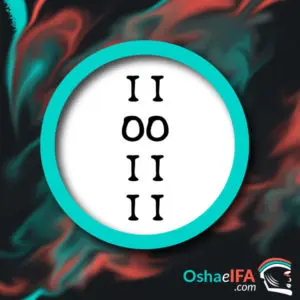

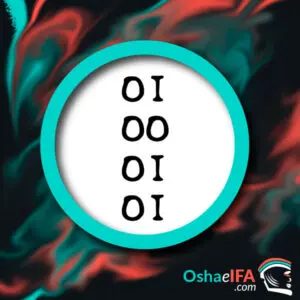
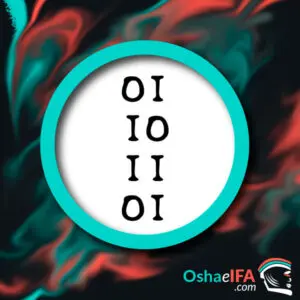
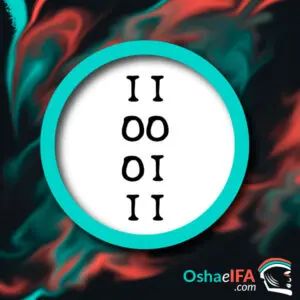
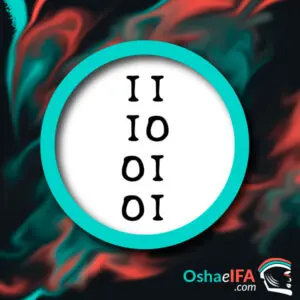
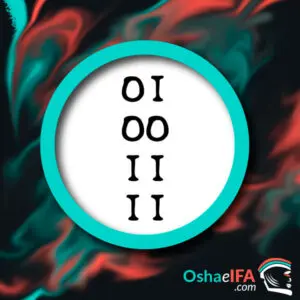

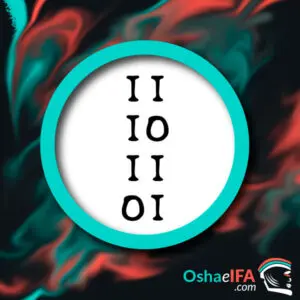
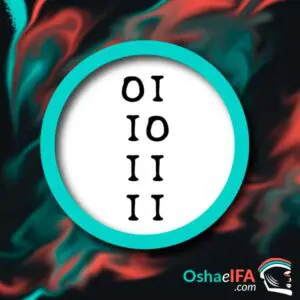
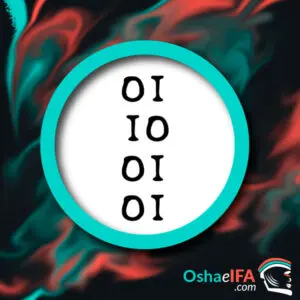
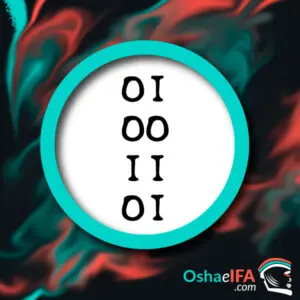



Despite the writing of the odun, which are like parables, it is very understandable so that the babalawos can close councils, works and roads.
Thank you.